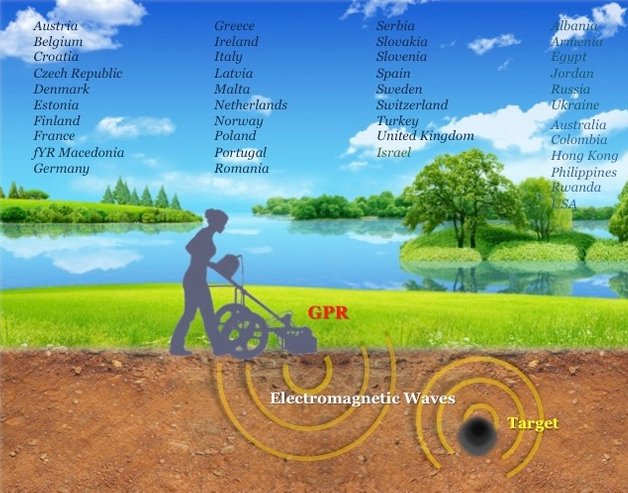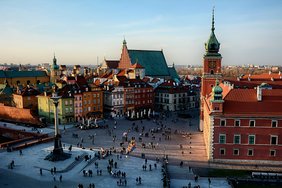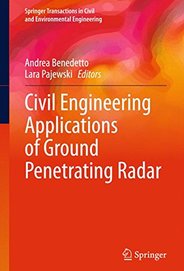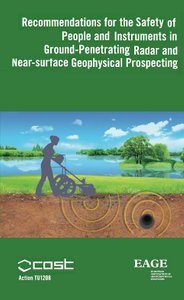Action TU1208
Civil Engineering Applications of Ground Penetrating Radar
COST Success Story
Future Events
The Chair of COST Action TU1208, Prof. Lara Pajewski, will participate in the upcoming Italian edition of the COST Info Day (27 June 2019, Turin, IT) and give an invited talk entitled "COST Actions as open networks of excellence where people and ideas can grow: A success story."
Selected info on Past Events
2019 & 2018 EGU General Assemblies, Vienna (AT)
Scientific Session "COST Actions in Geosciences: breakthrough ideas, research activities and results"
As is known, COST (European Cooperation in Science and Technology) is a EU-funded organization that enables researchers to set up their interdisciplinary research networks (the “Actions”), in Europe and beyond. COST provides funds for organising conferences, workshops, meetings, training schools, short scientific exchanges, and other networking activities, in a wide range of scientific topics. Academia, industry, public- and private-sector laboratories work together in Actions, sharing knowledge, leveraging diversity, and pulling resources. Every Action has a main objective, defined goals and clear deliverables.
Many Actions are operating in geosciences research areas. The 2018 and 2019 successful editions of our scientific session aimed at creating a common space for multidisciplinary scientific discussion, where EGU-GA delegates involved in running or recently ended COST Actions could meet, share ideas, present the research activities carried out in their Actions, and disseminate the scientific results of their efforts. The session represented a valuable opportunity for different Actions to identify possible synergies and establish new collaborations.
Overall, about 80 scientific contributions were presented during the 2018 and 2019 editions of our session, coming from 26 different COST Actions. Moreover, the session was of open to everyone, not only to Members of COST Actions, in fact several contributions came from representatives of other collaborative projects, national and international scientific networks, small research teams, and even individual scientists willing to disseminate the results of their studies in front of a wide and multidisciplinary audience, as an alternative to making a presentation in a thematic session.
To read a full description of the session and the detailled programme, please visit these pages:
- https://meetingorganizer.copernicus.org/EGU2019/session/31218 (2019 edition)
- http://meetingorganizer.copernicus.org/EGU2018/session/27232 (2018 edition)
2019 EGU General Assembly, Vienna (AT)
Scientific Session "Ground Penetrating Radar: Technology, Methodology, Applications and Case Studies"
This session aimed at bringing together scientists, engineers, industrial delegates, and end-users working in all GPR areas, ranging from fundamental electromagnetics to the numerous fields of applications. The multifold scope of the session was to provide a supportive framework for (1) the delivery of critical updates on ongoing GPR research, (2) open discussions and development of new ideas, (3) community-building through the identification of skill sets and collaboration opportunities, (4) vital exposure of early-career scientists to the GPR research community.
Thirty research works were presented during the session; to read a full description of the session and the detailled programme, please visit this page:
https://meetingorganizer.copernicus.org/EGU2019/session/30181
Final Conference of
COST Action TU1208,
Warsaw, Poland,
25-27 September 2017
The final event of our COST Action was held in September 2017. It was hosted by the National Institute of Telecommunications of Poland. Detailled information about the event and pdf versions of all oral and poster presentations are found here.
The conference brought together about 100 scientists, engineers, and industry delegates from all over Europe and beyond, working in the GPR field. Topics of the conference were:
- novel developments of GPR systems and antennas (outcomes of TU1208 Working Group 1)
- innovative procedures for testing the performance of GPR systems (outcome of TU1208 Working Group 1)
- safety issues in GPR prospecting (outcome of TU1208 Working Groups 1 and 2)
- guidelines for GPR inspection of roads, concrete structures (bridges, tunnels, building floors), and for GPR detection and localization of utilities and voids in urban areas (outcomes of TU1208 Working Group 2)
- advanced civil-engineering case studies where GPR was used for investigating roads, bridges, tunnels, railways, airports, buildings, concrete, and wood structures, and for detecting utilities and cavities (outcomes of TU1208 Working Group 2)
- free software tools for electromagnetic modelling of GPR (outcomes of TU1208 Working Group 3)
- free software tools for the processing of GPR radargrams (outcomes of TU1208 Working Group 3)
- innovative forward- and inverse-scattering, imaging and data-processing methods for GPR (outcomes of TU1208 Working Group 3)
- open database of radargrams (outcome of TU1208 Working Groups 2 and 3)
- advanced case studies where GPR was used for archaeological prospection and cultural-heritage diagnostics (outcomes of TU1208 Working Group 4)
- advanced case studies where GPR was integrated with complementary non-destructive testing methods (outcomes of TU1208 Working Group 4)
- advanced case studies where GPR was applied to further areas of investigations (outcomes of TU1208 Working Group 4)
- results of TU1208 Short-Term Scientific Missions
- results of TU1208 GPR Road Show
- results of TU1208 training activities and presentation of TU1208 Education Pack
- introduction to TU1208 follow-up initiatives: foundation of TU1208 GPR Association and Ground Penetrating Radar journal
Tu1208 GPR Road Show
TU1208 GPR Road Show was a series of 6 national dissemination events where stakeholders, companies, professionals, students and interested citizens could find out what is Ground Penetrating Radar (GPR), discover how this technique can be used for seeing the unseen, and learn about the applications of GPR in in civil engineering and beyond. These events constituted also a great opportunity for fostering a stronger interaction between academia and industry.
We organised successful Road Show editions in Lisbon (Portugal), Rome (Italy), Athens (Greece), Osijek (Croatia), Novi Sad (Serbia) and Pardubice (Czech Republic). Overall, 381 participants attended our GPR Roadshow. For more information about TU1208 GPR Roadshow, please visit this page.
TU1208 Training Schools
The Action organized 15 Training Schools that were attended by more than 430 Trainees. TU1208 GPR Association has continued with the organization of Training Schools: the most recent course was held in Rome, in May 2018. For more information about TU1208 Training Schools please visit this page.
GPR 2014, 15th edition of the International Conference on Ground Penetrating Radar
The International Conference on Ground Penetrating Radar is a longstanding traditional event, making the premier forum of research and applications in the field of GPR.
GPR 2014, the 15th conference in the series that has been held biannually since 1986, was held in the Square Brussels Meeting Centre, in Brussels, Belgium. This successful event was co-organised by the COST Action TU1208, along with the Université Catholique de Louvain. The conference was attended by 283 participants and topics covered by the 210 presented papers included: developments of novel GPR systems and antennas, advanced data processing algorithms for improved subsurface imaging, radar data modeling approaches and inversion strategies for quantitative reconstruction of soil and material properties, data interpretation in a range of fields, including geology and sedimentology, glaciology, environmental and agricultural engeneering (e.g., hydrological monitoring, digital soil mapping, forestry), civil engineering (e.g., utility detection, monitoring of transport infrastructures, nondestructive testing), archaeology and cultural heritage, and planetary exploration, among others.
The conference proceedings are published on IEEE Xplore. A Special Issue was published on the IEEE Journal of Selected Topics in Applied Earth Observations and Remote Sensing (IEEE JSTARS). The photos of the conference are here.
More information about GPR 2014 can be found on the conference website.
Research activities
TU1208 research activities cover all aspects of GPR technology and methodology: development and testing of radar systems and antennas; design and application of procedures and guidelines for the inspection of natural and manmade structures, in civil- and environmental-engineering applications, for cultural-heritage management, and in other areas; combined use of GPR and complementary non-destructive methods; development and use of advanced electromagnetic modelling, inversion, imaging, and data-processing techniques for radargram analysis and interpretation.
The first peer-reviewed scientific journal dedicated to GPR
Founded in September 2017 as a follow-up initiative of COST Action TU1208, Ground Penetrating Radar is the first peer-reviewed scientific journal dedicated to the publication of research and review papers, tutorials, software and data papers, communications, reports, and comments concerned with the GPR technique.
Ground Penetrating Radar is an open-access open-science journal, published quarterly. The first issue was published in January 2018. Papers are currently published free of charge for both Authors and Readers. All papers have a doi and are registered in Crossref.
We are looking forward to receiving interesting manuscripts and extending the Editorial Board!
Join us!
Participating will embark you upon a wide range of opportunities.
By joining TU1208 GPR Association, you will have the opportunity to participate in our networking activities and scientific projects. You will be in direct contact with scientists and experts working in the GPR field, establish new cooperations, and build the critical mass for project proposals to be submitted in the EU Framework Programme Horizon 2020 or in other competitive international programmes. For further information or to join TU1208 scientific activities, please take contact with the president of the association, Dr. Lara Pajewski.
GPR Imaging Challenge
In connection with IWAGPR 2017, the 9th edition of the International Workshop on Advanced Ground Penetrating Radar, a realistic 3D GPR model was created by Antonis Giannopoulos, Iraklis Giannakis and Craig Warren by using the new version of gprMax, which offers a challenge for testing GPR processing, imaging, and inversion algorithms.
The use of a realistic model for testing GPR algorithms can offer several advantages:
- algorithms can be tested in a much more robust manner than when using simplistic and clinical models that do not effectively represent the real complex environments and targets that are encountered with GPR;
- there is accurate knowledge of the composition of the targets, their precise location, and the exact makeup of the hosting media. Such detailed knowledge is not possible with experimental or field testing.
Before releasing information on the detailed construction and composition of the model, the modelled data were offered as an imaging and interpretation challenge to GPR researchers. A session was scheduled in the IWAGPR 2017 conference programme, in which some results were presented.
Welcome to our website! COST Action TU1208 was running from 4 April 2013 to 3 October 2017. The website is still alive and active, same as our scientific network. The various sections of the website are being updated and the Action's deliverables are being uploaded.
The main objective of COST Action TU1208 was to exchange and increase scientific-technical knowledge and experience of Ground Penetrating Radar (GPR) techniques in civil engineering, whilst promoting wider and more effective use of this safe and non-destructive method in the monitoring of structures.
Before the end of the Action, in September 2017, we have founded a non-profit association (TU1208 GPR Association), to continue the excellent work that was done during the Action and further support cooperation between Universities, research centres, private companies, and public agencies active in the GPR field.
Still in September 2017, we have founded Ground Penetrating Radar, the first peer-reviewed scientific journal dedicated to GPR, where papers are published in true open access, free to both Authors and Readers.
TU1208 Awards
TU1208 Praised as a
COST Success Story
("The Cities of Tomorrow: the Challenges of Horizon 2020")
TU1208 has been recognised among the running Actions as a COST Success Story and praised with the following statement:
TU1208 "Civil engineering applications of Ground Penetrating Radar" (Chair: Lara Pajewski, Roma Tre University, IT)
This interdisciplinary Action represents a milestone in GPR research, being the first European network ever existed in this field, in line with the spirit and goals of the ERA. In June 2014, it co-organised the 15th International Conference on Ground Penetrating Radar, the premier forum on GPR" ("The Cities of Tomorrow: The Challenges of Horizon 2020," September 17-19, 2014, Torino, IT - A COST strategic workshop on the development and needs of the European cities).
Publications
The Action published several international books, journal special issues, book chapters, journal papers and conference papers. For a complete list of publications and relevant statistics, please visit this page. In the following, instead, you will find selected information about a few books.
TU1208 published the Springer book "Civil Engineering Applications of Ground Penetrating Radar"
The book describes the most up-to-date applications of GPR in civil engineering, with documentation of instrumentation, methods and results. It explains clearly how GPR can be employed for the surveying of critical transport infrastructure, such as roads, pavements, bridges and tunnels, and for the sensing and mapping of underground utilities and voids. Detailled attention is also devoted to the use of GPR in the inspection of geological structures and construction materials, including reinforced concrete, steel reinforcing bars and pre/post-tensioned stressing ducts. Information on the design of GPR systems and antennas is provided. Advanced methods for solution of electromagnetic scattering problems and new data processing techniques are also presented. Readers will come to appreciate that GPR is a safe, effective, non destructive and noninvasive imaging technique that can be effectively used for the inspection of composite structures and the performance of diagnostics relevant to the entire life cycle of civil engineering works. For more information visit this page!
TU1208 published the book "Recommendations for the Safety of People and Instruments in Ground-Penetrating Radar and Near-Surface Geophysical Prospecting"!
The book offers an in-depth overview on the risks associated to Ground-Penetrating Radar and Near-Surface Geophysical Prospecting, providing the Reader with practical recommendations for the safety of people and instruments. Among the main topics dealt with in the book, the Reader will find:
- general recommendations for a safe prospecting and minimal safety equipment to be brought in the field;
- specific advice for experimental campaigns carried out in challenging environmental situations;
- appropriate precautions related to specific kinds of GPR applications;
- dangers associated to electromagnetic emissions and European regulations for GPR manufacturers and end-users.
The book includes a short medical first aid guide as well, which is specifically conceived for near-surface geophysical prospecting. Suggestions for correct use and safe transport of the equipment are finally provided. For more information visit this page!
For information concerning COST Action TU1208 and TU1208 GPR Association, please take contact with the Chair of the Action and President of the Association, Prof. Lara Pajewski. From 4 April 2013 to 3 October 2017, this website was supported by COST, European Cooperation in Science and Technology - COST is supported by the EU RTD Framework Programme Horizon2020. TU1208 Members are deeply grateful to COST for funding and supporting COST Action TU1208. As of 4 October 2017, this website is supported by TU1208 GPR Association, a non-profit association stemming from COST Action TU1208.
